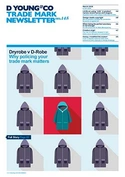Puma v Nike Footwear brands dispute FOOTWARE
The UKIPO has dismissed Puma’s opposition to Nike’s application for FOOTWARE, finding that the mark is not descriptive or customary in relation to the goods and services applied for in classes 9, 38 and 42.
Nike Innovate CV applied to register the word mark FOOTWARE as a UK trade mark in March 2019. The application covers goods and services in classes 9, 38 and 42, including computer software and hardware, telecommunications services and cloud computing services. The UKIPO accepted the application, which was subsequently opposed by Puma SE.
Puma opposed the application on the basis of Sections 3(1)(b), 3(1)(c) and 3(1)(d) of the UK Trade Marks Act 1994, on the grounds that the mark FOOTWARE is:
- Non-distinctive: the mark is an ordinary descriptive term for the goods and services applied for in classes 9, 38 and 42 and is not striking, surprising, unusual or arbitrary;
- Descriptive: the mark is an obvious combination of the words “footwear” and “hardware” or “software” and simply informs consumers that the goods and services covered relate to hardware/software in or for feet and footwear;
- A common descriptor: the mark is now customary in the relevant trade and has already been adopted by multiple users in connection with footwear and software/hardware technology.
Evidence
Puma filed evidence showing that it was the first company to integrate electronic hardware and software in sports shoes, in 1986, in addition to various articles concerning footwear products which include software or hardware, although these do not include reference to the term “Footware”.
Further articles were filed which do make reference to the term “Footware”, but the hearing officer noted that they showed only very limited evidence relating to use in the UK, and still less evidence of use in relation to any of the contested goods or services in classes 9, 38 and 42.
Evidence was also filed by Puma of EU trade mark applications containing the suffix “- WARE” in classes 9, 38 and/or 42 which were either partially or totally refused by the EUIPO. This was countered by Nike with evidence showing EU and UK trade mark registrations containing the suffix “- WARE” covering goods and services in classes 9, 38 and 42.
Nike further provided articles discussing footwear with embedded technology in which the products are variously referred to as “smart running trainers”, “trackable trainers”, “smart shoes”, “smart football boots”, “smart running shoes”, “connected footwear”, but notably not “Footware”.
Decision
The hearing officer dismissed Puma’s claim that the mark “FOOTWARE” is a combination of two non-distinctive elements, the combination of which amounts to no more than the sum of its parts.
She found that while “-WARE” is not inherently distinctive in relation to the class 9 goods or class 42 services applied for, given that it is likely to be perceived as referring to software, hardware, firmware or software as a service, “FOOT” cannot be found to be descriptive of such goods and is distinctive. She noted that there is no evidence that “FOOT” has a distinct meaning in relation to any of the goods or services covered, unlike, for example, “BOOT”, which may mean an item of footwear or an action in relation to a computer, depending on the context.
In relation to the telecommunications services covered in class 38, the hearing officer found that “-WARE” is unlikely to be perceived as referring to software, hardware or firmware, and again “FOOT” is distinctive in relation to such services.
In the hearing officer’s view, the mark FOOTWARE is imprecise and does not have an immediately apparent or easily recognisable meaning. The evidence does not establish that the mark is used descriptively in relation to the goods and services applied for, and it is unlikely to be used descriptively in future.
With regard to the claim that the mark FOOTWARE has become customary in the trade, the hearing officer found that the evidence was insufficient to support the claim.
Conclusion
The opposition was therefore dismissed in its entirety, and Puma was ordered to pay Nike £1,300 in costs.
